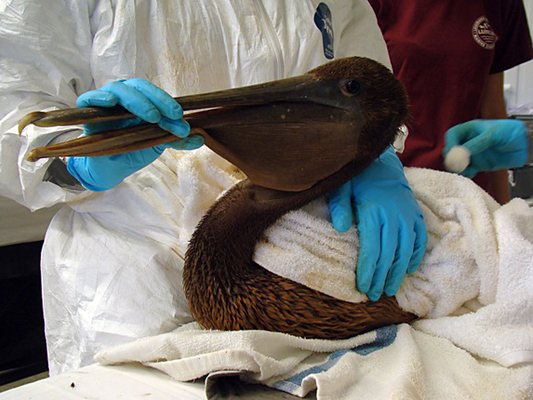
by Harvey Leifert Thursday, January 5, 2012

Workers with the International Bird Rescue Research Center clean a brown pelican that was covered in oil from the Gulf of Mexico. IBRCC, Creative Commons Attribution 2.0 Generic
Brown pelicans mired in oily mud along the Louisiana coast are icons of the BP Deepwater Horizon oil spill, daily reminders of the ongoing disaster’s impact on the Gulf coast. Yet, says a leading marine ecologist, the greater long-term danger to wildlife may be occurring out of sight, deep beneath the oily surface of the water.
Thomas Shirley of Texas A&M University’s Harte Research Institute for Gulf of Mexico Studies in Corpus Christi addressed reporters on June 8, World Oceans Day, in a program organized by the National Press Club and SeaWeb in Washington, D.C. Just last year, Shirley said, his institute published an inventory of marine life in the Gulf, an astounding 15,419 animal and plant species, “not including microbes or protozoans.”
Scientists had divided the Gulf into eight sectors for the study, and the north-northeast sector, in which the BP oil spill is located, had the second-highest number of species. In this sector, scientists logged 1,461 species of mollusk (such as clams and snails), 604 polychaetes (marine worms), 1,503 crustaceans (including shrimp and crabs), 1,270 fish species, four sea turtle species, 218 different birds, and 29 marine mammals.
Even more sobering, Shirley said, was the discovery that the area around the leaking well contains the Gulf’s highest number of species at depths of 1,000 to 3,000 meters: 1,728 animal species, including 135 species found only in this area. Six marine mammals and four sea turtles are among the 74 species in the sector listed as threatened or endangered.
The geology of the Deepwater Horizon’s sector is significant, Shirley said, in that the sea bottom is not a typical muddy flatland. Its topography includes a deep trench, called the DeSoto Canyon, and an apparent mountain range, the Pinnacles, which is actually composed of the remains of Pleistocene coral reefs. These features provide habitat for present-day corals, sponges and many animal species that are preyed upon by sperm whales.
Oil can affect marine wildlife in three ways, Shirley noted.
First, physical effects include death by suffocation, with oil blocking air passageways or gills. By desensitizing sensory organs, oil can affect a creature’s ability to find food or detect predators. Many birds and marine mammals die of hypothermia, as oil reduces the insulating effect of feathers and fur.
Second are the toxic effects of subsea oil, which include skin ulcerations and damage to the spleen, adrenal tissues, lungs, liver and other organs of sea animals. Suppression of the immune system through ingestion of oil leaves many animals vulnerable to otherwise manageable infections.
Finally, there are indirect effects, including decreased growth rates, reduced fecundity and higher mortality rates for larvae — effects that often go unreported, Shirley said. Animals that are not themselves directly affected can suffer or die for lack of prey, when the latter has been decimated by oil.
“Most of our concerns about this oil spill are based upon uncertainty,” Shirley told reporters. “We’ve never faced an oil spill in the U.S. of this magnitude; this is the largest. We’ve never faced these deep undersea plumes with this tremendous volume. We don’t know how that’s going to act. We’ve never faced an oil spill that had almost a million gallons of dispersant used on the oil. We don’t know how all that’s going to play out.”
Furthermore, researchers “should know more about this,” he said. “There should have been research in advance on how to handle these kinds of spills, how to handle a blowout … that occurs at 5,000 feet depth, but we don’t have that.”\
© 2008-2021. All rights reserved. Any copying, redistribution or retransmission of any of the contents of this service without the expressed written permission of the American Geosciences Institute is expressly prohibited. Click here for all copyright requests.